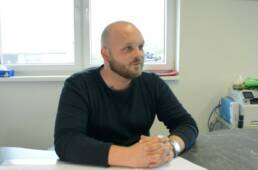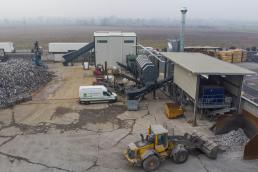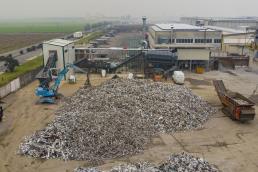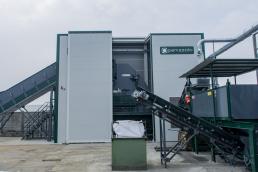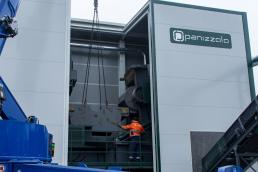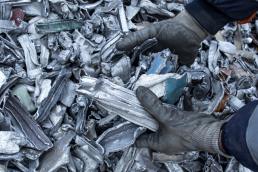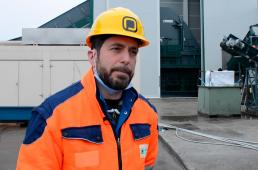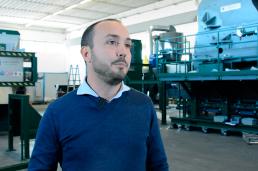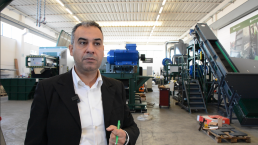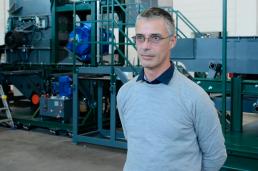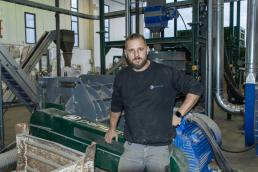The technological renewal of the austrian company Josef Schuster GmbH
The technological renewal of the austrian company Josef Schuster GmbH
Located in Asten near Linz, this family-run company has been operating in the collection and processing of ferrous scrap for over 30 years.Martin Schuster, who took over the management in 2016, leads the business with a strong spirit of productive and economic renewal. With this in mind, it has increased the quality of the internal treatment cycle by installing two solutions supplied by Panizzolo Recycling Systems.
When Schuster Metall-Recycling GmbH was born and how it has evolved to this day?
The company was founded by my parents in 1985, focusing mainly on the collection and trade of scrap metal. In 2016, with my entry into the company management, we diversified and increased the type of metal collected, allowing us to grow our business, quadrupling the work space and taking it from the initial 4,000 m2 to today’s 16,000 m2. Over the years we have expanded our range of action to include other waste such as paper, waste and wood, however we still consider ourselves a company strongly focused on the collection and treatment of metal and ferrous scrap.
Tell us how you work and how you position yourself on the Austrian market
We currently consider ourselves a medium-sized company with 25 employees, including clerks, workers and drivers. We cover all stages of the process, from the purchase of scrap to the sale of the finished product. The areas in which we work most are located in the regions of Ober-österreich, Nieder-österreich and Salzburg where we receive scrap from both traders and companies that produce their own production waste.
Once stored and sorted, the scrap is sent in one of the two Panizzolo treatment cycles. The mixed metal is sent to the special plant with Mega 1100 for the recovery of iron, copper, brass and aluminum. Unlike the aluminum cans, they are ground by the Flex 500 Mobile hammer mill plant.
Overall, the load of material circulating in our company is about 40,000 tons per year. The two Panizzolo plants – Flex 500 Mobile and Mega 1100 – allow us to work simultaneously on the two main types of scrap. The Flex 500 is used for aluminum cans and allows us to process approximately 2.8 tons / hour with a total input load of approximately 10,000 tons per year. The Mega 1100 is used in the processing of mixed metal scrap, with a production capacity of about 20 tons / hour.
The outgoing metals are sold in Austria, Germany and Italy.
Why did you buy Panizzolo hammer mills?
I wanted to introduce new technologies into the company that would allow me to work mixed metal, a type of scrap that is increasingly found in Austria and throughout Europe in general. I therefore came across the Panizzolo recycling plants, finding the treatment cycle and operation of the hammer mills very interesting. I also probed other companies, however in the end I realized that the technologies offered by Panizzolo were the solution that best suited my production and quality needs.
Karim Bekkous, my sales representative in Panizzolo, was able to follow me with professionalism and competence. The meetings were limited due to the health emergency, however any doubts or questions I asked always followed a prompt and comprehensive answer. Likewise, during the assembly and training phase, I was pleasantly impressed by the seriousness and professionalism of the Panizzolo technicians.
I had the opportunity to see the Panizzolo plants in action during my visit in a German Company , touching the quality of the machinery and comparing myself with the experiences of the end users. However, what most convinced me at the time of purchase is that, compared to other models on the market, the Mega 1100 and Flex 500 Mobile hammer mills are able to balance other production performance with low energy costs. Quality that, added to the compact dimensions of both machines, are indispensable for my business objectives.
Focusing on the treatment of post-consumer cans and mixed metals, I preferred to insert two distinct treatment lines. In this way I can work on two fronts simultaneously, keep the outputs separate and maximize the value of the metals at the time of sale. However, the interchangeable cradle system remains a decisive aspect as it allows me to optimize the hours dedicated to maintenance.
How COVID has affected your production?
Even during the health emergency we never stopped working, thanks to both the availability of the type of scrap and the reserves of material in our possession. Both plants were bought in 2020, in the midst of the COVID pandemic. However, unlike other companies, we did not let the situation intimidate us but we thought about the business opportunities that would be created in the near future.
What do you think about the change of prices?
During the month of December last year, prices began to rise exponentially, in fact, to date the materials are very expensive. At the moment this is not a problem but, if prices were to fall in the coming months, there would obviously be a large amount of money lost for scrap and recyclers traders.
What are your thoughts for the future?
We are expecting that in the coming months we will be able to produce up to 25 tons / h of treated mixed metal with the Mega 1100. Considering the fact that it is easy to find these scrap both in Austria and throughout Europe, we are currently focused on maximizing productive and profitable performance. However, we constantly monitor market trends and, also thanks to the interchangeable cradle in the Panizzolo mills, we are ready to change the direction of treatment if needed.
The aspect that remains fundamental is that here in Austria, as in other European countries, our sector is increasingly moving towards the use of those technologies that allow a higher quality treatment of metal scrap.
The new challenges in the industry, between diversification of the processed metals and a recovery of secondary quality raw materials
The new challenges in the industry, between diversification of the processed metals and a recovery of secondary quality raw materials
In a new interview with Andrea Pensotti, member and owner of Com.Steel Spa, we do a report of the year just ended, characterised by the pandemic, and we analyse outlooks for 2021 which will witness important changes in the sector.
We left our old headquarters in January 2020. Now, what has changed after a tough year due to the Covid-19 health emergency?
Fortunately, the pandemic had the direct effect of only postponing our transfer to the new headquarters by three months. By directly completing 2 km of road construction and of the bridge above the railway, we detoured truck traffic away from the city centre, a regulatory obligation required for the release of the new authorisation. Thereby the new 66,000 m² plant was inaugurated on January 11, 2021, and, at the same time, all of the tests on the new Panizzolo Mega 1500 hammermill were completed, today fully in service.
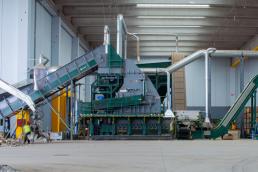
Changes on the market in the second semester of 2020 brought about important variations in the demand and supply of scrap. We focused on other types of incoming metals, without prejudice to our objective of tripling the production quantity of the processed materials. We simply reset our timetable. We currently work with a production capacity of 50%, but which will be increased to 80% by the end of the year.
Speaking more in general, our sector was not particularly affected by the pandemic. 2020 started very positively and, despite two months of practically total stop, we only recorded a -3% deficit at the end of the year.
If we more specifically analyse the scrap sector, we will definitely notice a great difference between those who processed and those who only marketed. The real winners were those who were able to differentiate their recycling cycle and can get going again today with a strong advantage, especially as far as investments are concerned.
How did 2021 begin?
Entering 2021, the demand for raw materials has skyrocketed. Last year’s drop in production is giving way to a gradual recovery of companies. Therefore the demand is in constant increase, but certain types of scrap are starting to be lacking. Ours is a particular sector: we suffer both the negative and positive consequences later than the rest of the market. This is why flexibility is more than ever the keyword today, valorising those scraps that are easiest to find.
So what are your goals?
We want to be ever more focused on the treatment of metals and on the diversification of the processed materials. This is also why we immediately started the new Panizzolo grinding and sorting plant in January.
The more we work, the more we understand that steelworks want a refined product. Quality is an element that is ever more awarded and looked for, while low efficiency products, polluted or contaminated by other metals, are becoming materials that the buyer has ever less interest in.
This is why in 2021, the new Panizzolo plant will mainly be focused on the treatment of tins from MSW, already ideally tested in the recovery of ferrous proler and in the separation of inert fractions. In April we will finish the revamping of the Flex 1300 Mobile drum mill, incorporating it in line with the Panizzolo plant and allowing us to obtain better quality proler. It will be cleaner and thicker, ideal for Italian and European steelworks.
As we already said, for us nothing ends up in a landfill. The separation systems upstream of the Mega 1500 allow us to recover many inert fractions. Glass dust, for example, is resold to produce new containers while the inert pieces are sent to waste to energy processing plants, thus creating a continuous production cycle.
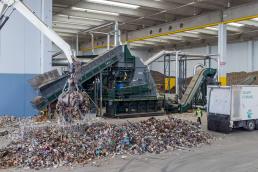
Speaking of the new Panizzolo plant for the treatment of tins, how was its processing logic studied? Do the initial results satisfy you?
Thanks to the experience gained in the use of previous Panizzolo machinery, together with our technical department, we’ve perfected the plant inside our new areas, allowing us to perform a complete and non-stop treatment.
Our operators have been instructed and trained regarding the various processing stages and now, to complete the test stages, we’re working with Panizzolo technicians on programming. Indeed optimisation of the hammermill software is fundamental and all of the necessary changes must be made for the correct setting of the machine.
As far as wear, maintenance and use are concerned, the Panizzolo Flex 1300 hammermill was a guarantee. We expect the same from the new Mega 1500, especially because in the first two months of processing the only thing that we’ve done, besides inspections and routine greasing operations, was to invert the working direction of the hammers.
We are satisfied with the collaboration with Panizzolo and its staff as everything was done according to the state-of-the-art. We’ve known Panizzolo for decades and their dedicated service technicians are as trustworthy as can be.
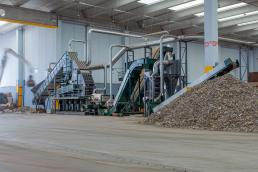
Do you have any information on incoming tins?
The tins come both from Italy and abroad, for an incoming volume of approximately 2000 tons a month. The hammermill works at a continuous cycle to keep the production quantities high. Market prices are currently very high and this material is easy to find.
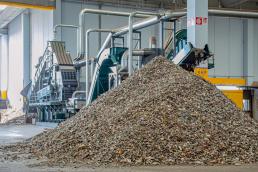
What will be your challenges in 2021 and in the coming years?
It will mainly be the need of installing ever more sophisticated plants to remain in the forefront. Not very many are going in this direction. Companies are afraid of the emergency situation and find it difficult to make an investment plan for the near future. Nonetheless, to get restarted we need to diversify production and to work on the quality of the finished product.
At Com.Steel, starting up new technologies will definitely be a topic for discussion in our 2022/2023 budget. We are actually very pleased with the Panizzolo lines that we are using and so we hope to keep working with them even for the installation of a future refining line.
From scrap to aluminium ready to melt: the new recycling plant in Deral
From scrap to aluminium ready to melt: the new recycling plant in Deral
Starting from aluminum scrap, Deral Spa produces high quality billets for the national and international market. To ensure high production quality, the material loaded into the ovens must be carefully separated from any impurities. For this reason, the company has its own treatment cycle which has recently been enhanced by the Panizzolo Recycling Systems plant with Mega 1100 hammer mill.
With the starting of the plant, we had the pleasure of interviewing Mauro Cibaldi and Pietro Giulio Vincoli, respectively President and CEO of the Italian foundry DERAL S.p.A
Good morning Mr. President. How Deral was born?
Cibaldi: Deral was founded in 1986 in Manerbio, in the province of Brescia, initially dealing with scrap discarded from extrusion production cycles and from which we produced new billets. Over the years, the evolution of production has led us to expand the range of incoming aluminum, reaching today to be able to insert material from the demolition of windows and profiles into the melting cycle.
This evolution has introduced greater attention to the quality of recycling and to the enhancement of the raw material from scrap. In 2015 this process saw the replacement of the old line with a first Flex 1000 mobile drum plant in Panizzolo complete with eddy current. Then over the years we have also implemented it with an x-ray selector that allows us to effectively identify and separate the secondary alloys from the primary aluminum ready for use.
At Deral today we are structured for a production of around 40-45,000 tons / year of finished product and we expect production growth over the next ten years, thanks to the new Mega 1100 and the rapidly expanding Italian market.
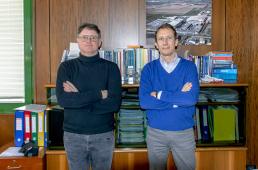
A few numbers about your staff and your business?
Cibaldi: To date, the staff consists of 35 employees and 5 directors, we occupy an area of about 28,000 square meters of which 4,000 square meters are dedicated to production in a covered warehouse and 600 square meters of offices. By 2030 we expect to be able to expand production with an additional furnace and a new line for casting billets
As regards the flow we can say that we receive on average about 40 / 45,000 tons of materials divided between scrap, pure aluminum ingots and, to a minimum, alligants. The output is mainly in the form of an aluminum billet and, to a minimum, a waste that is defined as slag. All our waste, slag or waste that comes out of the shredding system that is not correct for us, has an economic value and is therefore recovered.
How did you know Panizzolo Recycling Systems?
Vincoli: I went to a customer of yours to see a Panizzolo recycling plant at work, in particular on the crushing process of electric motors. I immediately liked the basic idea: more compact hammer mills with a more than adequate investment and management cost, compared to a market that generally sees large machinery with considerable costs. An example? The maintenance of a 100 kg hammer is not that of a 22 kg hammer and with the Flex 1000 mobile drum we have processed 10,000 tons of material for 3-4 years.
How the Panizzolo system makes your treatment cycle more efficient?
Vincoli: At the beginning of the business we worked with shear presses and carried out the selection and cleaning phases manually. In particular, our double shaft shredder produced a very large piece of aluminum (50-60 cm) and forced us to slow down production. Furthermore, the quality of the product was not perfect with clear repercussions at the time of casting. For this reason, in recent years we have opted for complete and more effective systems such as the Panizzolo line, up to the new x-ray selection.
One of the first Panizzolo machines installed, due to timing reasons, was the Flex 1000 mobile drum, started up in a very short time while now we have switched to a stationary Mega 1100 hammer mill. Our first need was to increase the production capacity of the grinder and from the first accounts of the new production cycle we have already seen a clear improvement. With the grids set for our scrap we have calculated a productivity of about 15/16 tons / hour.
A high level of control is important in a good machinery. We want to support the operators with new technologies for monitoring production, so that the plant operates every day at its maximum potential. The new software, which operates at industry 4.0 logic, will analyze all the operating data of the machine and will provide that fundamental feedback to understand where we are going and how we can improve.
What prompted you to choose Panizzolo Recycling Systems as your technology supplier?
Vincoli: Surely one of the reasons is that Mauro Panizzolo has a long experience with grinding and hammer mills. He used them personally, noted strengths and weaknesses and created a product based on his own experiences. There are other shredders of this size but they are not up to the processing of our ferrous scrap. I also found the Panizzolo technical office to be very prepared and professional.
The structure of the Panizzolo hammer mill at the carpentry level is good. I personally visited the plant where all the machines are built, noting that the carpentry is also inserted in an international context of high quality for railway supplies
This is further confirmed by the fact that our Flex 1000 Mobile had no problems, even though it worked for many years at an intense production regime.
Furthermore, the Panizzolo plant stands out for its simplicity and low operating costs, features that avoid having to resort to highly specialized or constantly present personnel. Following the simple routine maintenance, the Panizzolo mill has no problem, with undoubtedly lower costs than the double-shaft hydraulic shredders on the market.
There are other models on the market as well, but normally they are mills of 1,000 horsepower and up. Unlike, I was looking for a medium-sized hammer mill and in Italy the high-quality medium-sized shredder is located in Panizzolo. I think it is counterproductive to treat a scrap like ours with high power systems. The Flex 1000 Mobile drum has allowed us to operate with a much less demanding system and with a productivity, in two working shifts, between 100 and 150 tons of processed material.
How important is the patented interchangeable cradle in grinding processing?
Vincoli: The interchangeable cradle has a simple and effective engineering that allows for really fast maintenance. Not only the extraction of the cradle, but also the extraction of the rotor itself is very practical. In a large hammermill, maintenance of the hammers would normally require a production stop of at least one day. Unlike in Panizzolo machines, it only takes a few hours if you do not have a spare rotor. With the Flex 1000 Mobile we had two rotors and therefore set off in less than half an hour
Returning to the cradle I think its sizing is ideal, so much so that I’m sure I will retire before having to replace it! Seeing the side walls and the reinforcements below I don’t think it will be subject to wear for at least 10 years!
What hourly productivity do you expect from the new plant?
Vincoli: Definitely we will produce at least 12 tons per hour, but since the recent start up we have already calculated that we are producing an average of 15/16 tons per hour.
How is your commercial presence distributed between Italy and abroad?
Cibaldi: Regarding the input we have to make to major distinctions. Scrap is predominantly Italian, with a quantity of less than 10% coming from abroad. Conversely, the pure aluminum ingots are all produced outside the EU.
Regarding our sales process, 60% of our turnover is directed to our parent company Estral. The remaining 40% is almost all destined for the Italian market, where there is the presence of about 45 extruders.
What are the environmental policies that you apply in Deral Spa
Cibaldi: We are ISO 9001 and ISO 14001 certified and have the certificate 333 of 2011 which certifies the transformation of our waste into secondary raw material. In addition, in December 2020 we also received the environmental assertion validation certificate.
The environmental awareness in Deral is growing constantly and leads us to apply what are defined as the “best available technologies” in our ovens, as well as to maximize the use of energy from renewable and natural sources. In June 2020 the new B.A.T. for the metallurgy sector, providing for a continuous monitoring system for emissions. For this reason we have installed on all our fireplaces special detectors that analyze the outgoing emissions every 5 seconds.
For the energy aspect, together with our parent company, we have an energy manager through which we plan the use of renewable energy. In addition, in 2020 our parent company completed a 1 megawatt solar panel system and therefore many machines can benefit from self-produced energy.
How the foreign aluminum market is structured?
Cibaldi: Italy is the European leader in the field of extrusion both in terms of production and quality and in this panorama Deral is among the five main national billet producing foundries.
The strong propensity for recycling has allowed Italy to develop more than other European countries where, unlike, the creation of a few large foundries has been favored. Italy therefore has a very large production and quality capacity with an export trend that is growing every year.
As far as the final purchase area of our products is concerned, we can say that the German automotive sector dominates. Many German vehicles are structured with Made in Italy aluminum.
What are your sources on the market trend?
Cibaldi: We are operators constantly active on the market, interacting with many subjects. This allows us to find news on the trend day by day, together with the classic information channels such as sector publications.
We are also part of the CENTROAL trade association, of which I am also president, because we believe that associations help individual realities. If there are regulatory problems, which in some way can have an impact, going it alone makes no sense.
What is your opinion on the changes in the sector in the coming years?
Vincoli: Big changes are taking place in our industry. In the next 10/15 years there will be more and more structured companies with complete systems that carry out the total enhancement of the material internally. In this process, the figure of the mere scrap dealer will disappear. In order to face the near future, companies must therefore structure or deconstruct themselves. An example? As a foundry, we collect demolition material or ready-made material, there is no more middle ground.
In Deral, thanks to the very strong demand for aluminum and the regulations aimed at reducing CO2, we are considering making an additional investment in the treatment plant. For this reason, I think that the 1100 Mega Panizzolo shredder has considerable chances of success for the treatment of aluminum. With the same machine it is possible to work both the profile and the casing and also other types of aluminum. However, it remains a machine with a decent size at low cost.
Cibaldi: At a European and national level, a whole series of incentives are flourishing on products and materials that have particular value within the circular economy. Among these materials, aluminum plays one of the most important roles. Aluminum is 100% recyclable, its recycling process requires 1/20 of the energy that would be used starting from the raw material. It is used more and more due to its lightness and strength and involves very little CO2 emissions during melting. All these are elements on which the focus is predominantly and will ensure that aluminum becomes the material of the near future.
Live from the installation site: assembly and testing operations of the Mega 1100
Live from the installation site: assembly and testing operations of the Mega 1100
The greatest strengths of Panizzolo recycing solutions are the simplicity of installation and final testing. But how are these peculiarities realized and what benefits do they actually bring to the customer?
At Deral Spa, one of the most important Italian aluminum foundries, we clarified these questions and much more together with Mauro Bassan. While he was checking the final work of the technicians, he explained us the major mechanical features of the Panizzolo hammer mills, the pluses that lead to the enhancement of metals, the simplicity of access to the grinding chamber as well as the final stages of training with the operators.
Live from the installation site: electrical operations with the Mega 1100
Live from the installation site: electrical operations with the Mega 1100
The electrical assembly and first start-up test of Panizzolo #recyclingplants follow a specific procedure. Once the connections and the most fundamental tests have been completed in our company, standard works are completed in our client’s site in order to ensure an efficient start-up in the shortest possible time.
Our last alluminium profile recycling plant with Mega 1100 Hammermill gave us the opportunity to see together with Andrea Simoni the most important phases of these works: the electrical briefing with the customer, the implementation of 4.0 industry, the start-up tests and the latest electrical and software innovations installed.
Merry Christmas and Happy New Year from Panizzolo Recycling Systems
Merry Christmas and Happy New Year from Panizzolo Recycling Systems
Season’s greetings with all good wishes for you and your family
On this occasion, we inform you that our offices in Piove di Sacco and Arzergrande will be closed for the Christmas holidays in the following period:
FROM 24 DECEMBER 2020
TO 03 JANUARY 2021
WE WILL REOPEN FROM MONDAY 04 JANUARY 2021
Our sales department will be glad to help you by e-mail
ECOMONDO 2020 digital edition: the consolidation of the South-European market
ECOMONDO 2020 digital edition: the consolidation of the South-European market
We conclude the cycle of interviews with Martino Di Nola, area sales manager recently introduced in Panizzolo Recycling Systems but with a long experience in the scrap market. Martino will tell us about the commercial changes caused by the health emergency, as well as the latest news in Spain on the front of the recycling plants installed.
“Surely the thing that had the most impact from the point of view of the remote control of the works, was the absence of any type of international fair, starting with the cancellation of IFAT in April, to the recent cancellation of the physical event of Ecomondo.”
“From this point of view we have the advantage of having a proprietary recycling plant that allows, in the event that we cannot be physically with the customer, to be able to show the machinery in operation and at the same time respect the distances and limitations of the law.”
“In these days we are finishing to install a plant in Spain. It goes from the primary shredder to the x-ray separation, flowing through our hammer mills, eddy current, dynamic shake. The plant will allow a complete End-of-Waste treatment cycle, with the possibility of extending the spectrum of input materials as much as possible.”
“The prospects for 2021 are certainly good. We had a 2020 that maintained the goals set in 2019 and in the coming months we will conclude many important negotiations started in the second half of this year.”
ECOMONDO 2020 digital edition: Panizzolo and the Northern European market
ECOMONDO 2020 digital edition: Panizzolo and the Northern European market
Karim Bekkous, area sales manager in Panizzolo, tells us about the "particular" Northern European markets, the scrap companies that compose it and how the presence of the Paduan company has been consolidated thanks to the quality of its recycling solutions.
“Speaking specifically of some markets such as Germany, Holland, Belgium, they remain “particular” markets, as, in addition to international competition, we are faced with local competitors, therefore in front of producers of recycling solutions no engineering studies, of course they ask for particular attention and I must say that also in this case, Panizzolo made all the technical staff available to me as support to give clear and concrete answers.”
“In my experience, as regards the markets of Central and Eastern Europe, I must say that the greatest satisfaction is that of having received excellent feedback from these markets, through an explanation of the logic of the operation of the plants and thanks to our plant, where we were able to carry out a whole series of tests, our customers have chosen us for different solutions, finding our products of excellent quality, without forgetting the relationship between investment, ton / h production and quality of the final product. our professional growth has been exponential based on the plants installed.”
“Panizzolo is currently in full development throughout Europe, confident of achieving consolidation in other markets in the two-year period 2021-2022, with the wish not to be faced with situations like the one we experienced in 2020, which despite everything we have managed in a manner optimal, carrying out all the projects and achieving the set goals thanks to the combination of many people, both from our customers and from us who have worked with a common goal.”
ECOMONDO 2020 digital edition: Panizzolo's technological innovations
ECOMONDO 2020 digital edition: Panizzolo's technological innovations
Fabrizio Scussolin, area sales manager at Panizzolo Recycling Systems
“Even if Ecomondo had to stop due to the health emergency, the italian scrap companies continue to contact us and choose our machines and our recycling solutions.
Both before the lockdown, during the lockdown and after the lockdown, we have not found any drop in requests and relations with the Italian recycling companies.
We are already seeing a significant increase in orders in the Italian market, with concrete prospects for 2021. italian companies are not afraid to invest, they aim for the final quality of the outputs and, thanks to the new models of hammer mills, we could satisfy a greater range of treatment needs thanks to 30% more productivity with the same electrical power installed.”
Interview with Luigino Menegatti, owner and sales manager of Generation 3.0.
Interview with Luigino Menegatti, owner and sales manager of Generation 3.0.
Located in the province of Vicenza, Generation 3.0 has commercial relationships all over the world, purchasing and exploiting a wide range of metal and ferrous waste and supplying secondary raw materials to the main national and international foundries and steel mills.
Anticipating the recent market changes, Luigino Menegatti, together with his sister Valentina, have long planned a series of technological investments to perform End-of-Waste treatments even on the heaviest scrap. The start-up of the Panizzolo Recycling Systems refining plant allowed us to get to know the Menegatti family and their next business objectives better.
Good morning Luigino. How was the company born and how is it developing?
Generation 3.0 was founded in 2016 by my sister Valentina and I. We took over the business of Nuova Europa Metalli, of which our father had been the owner since 1983, embarking on a new path aimed at intercepting emerging market trends. Right from the start we invested in the best recycling technologies, consolidating excellent business relationships all over the world and differentiating ourselves from the classic scrap dealer.
Being innovative is very important to us. We have launched a company policy aimed at enhancing the heaviest waste, with the aim of recovering up to 95% of the incoming material and from which we are reaping many economic benefits with satisfaction.
Compared to the role you play in Generation 3.0, what is your experience and your vision of the scrap market?
In the role of commercial director, I directly follow the purchases and sales of scrap and raw materials, also ranging in researching and analyzing new technologies on the market. Time permitting I also point to directly supervising the internal treatment cycle. Starting to work in my father’s company at the age of 18, I have built up an important background of pure practical experience. Also working a lot with abroad, I was able to develop a strong interest in the treatment of scrap, especially in the enhancement of the more complex types.
Landfills will no longer be sustainable in the long run and many countries are blocking the import of waste. My vision of the future is a market where scrap is recovered and refined as much as possible, selling a high quality and palatable final product anywhere in the world.
In which countries are you commercially present? What type of scrap do you treat?
Our range of action, both in buying and selling, extends to almost all continents of the world. We have several contacts with steel mills, foundries and raw material traders. We periodically diversify purchases and sales according to market needs, specializing in waste that must be handled and avoiding to compete for the purchase of semi-finished products such as sheet metal, turnings and sheared demolitions. In general, we prefer to purchase waste from other treatment lines, such as mixed metals, cans and zorba, which we purchase because we are able to enhance the metals contained thanks to the Panizzolo Recycling Systems refining plant.
Can you give us more details about the company structure?
In Generation 3.0 today we have about 13 employees, in a production area of about 30 thousand square meters. Inside there is an 800 horsepower hammer mill and various separation systems for the enhancement of the ground. We are currently authorized for 22,000 tons of waste per year but by the end of the year we will activate the new authorization, the second largest in Veneto, allowing us to move to 130,000 tons of incoming waste as well as increasing the range of CER codes.
Our goal is to become one of the leaders in the sector and, by marketing with the whole world, we must have an adequate storage area. Generation 3.0 is subject to Integrated Environmental Authorization (A.I.A.). We are also ISO 14000 and ISO 9000 certified and we scrupulously apply our internal environmental policy.
In choosing this path you have been influenced by the “Chinese National Sword”?
Not at all. When my sister and I started Generation 3.0, we already knew our goal was to install a refining plant. The closure of China is the result of twenty years of desperate exports, where certain waste was not treated because it was considered unprofitable. Unlike today the market needs to enhance them.
Since 2016 I have traveled to many European and non-European countries, looking for the plant that best suits our production needs. In the end I found that the one offered by Panizzolo was the most performing and technologically advanced
Can you explain better how you proceeded with your choice?
I went to the most interesting companies bringing samples of my material, in order to concretely see production, quality and wear.
By building a business plan for each plant, I identified in Panizzolo the right compromise between economic cost, productivity and long-term maintenance.
Panizzolo Recycling Systems is a well-known reality in Italy in this field. After a preliminary visit, I was able to test and touch the quality of the granulates in the Piove di Sacco plant. The machinery has very well designed precautions, especially the refining hammer mills. The material I deal with contains significant amounts of steel, iron and aluminum. Not being able to use traditional blade mills, the grinding method used by Panizzolo is truly intelligent, simple and innovative.
There were no other companies that offered comparable or interesting grinding systems?
When new, all grinders look interesting and beautiful to look at. The problem, however, is how the plant will behave in the medium to long term, what machine downtime it will be subject to, the wear it will suffer, the costs of spare parts and more.
The waste we deal with in Generation 3.0 has a percentage of metal that fluctuates between 10 and 20 percent, so for me the component of management costs is really very relevant.
Weighing all these things we concluded that Panizzolo Recycling Systems offered the most intelligent solution, with the right compromise of quality and processing cost, allowing us to make a good profit margin.
The purchase decision was influenced by the fact that Panizzolo operates directly in the treatment of scrap?
It certainly had an impact, because the best experience is in the field. Panizzolo Recycling Systems was able to offer me more guarantees than other companies. I was able to see with my own eyes design choices that were not taken for granted, made to protect the production interests of the output quality system.
The quality of the structures and carpentry is in line with the major European plant leaders, while its distinctive advantage lies in being able to modify and implement the plants according to production needs. Unlike other manufacturers, they do not contemplate the idea of listening to customers and making even small changes.
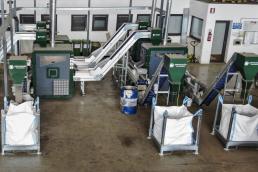
What investments have you planned to make with Panizzolo in the near future?
Over the next few months, we will install the Flex 500 Stationary Refine hammer mill. This will allow to pre-treat the material and increase the production performance of the refining plant.
I chose to rely again on Panizzolo Recycling Systems because its hammer mills have a very intelligent design, giving me an especially positive impression the double pulley rotor, the change of components subject to wear and the patented interchangeable cradle. A simple and high-quality machine that, like the refining plant, will allow me to save a lot of time.
While defining the layout, what struck you most?
I was very pleased that the company analyzed my production needs, recommending several upgrades that would further help me. In this way I have had confirmation of their vision aimed at maximum customer satisfaction, thanks to a continuous Research and Development activity.
What projects do you have for the refining plant? Where do you expect to arrive with respect to hourly productivity and quality of outputs?
Assuming that everything will depend on the quality of the incoming waste, our goal is to reach around 2.5 tons / h of incoming waste, in two daily 8-hour shifts. We will do two days of continuous production of 16 hours, while in the third we will dedicate a couple of hours for routine checks and maintenance. Cleaning, greasing, replacement of components subject to wear are fundamental activities to keep the system always efficient and performing at one hundred percent. Keep in mind that in the evening, at the end of the shift, I always demand that the most visible production areas are tidy and clean.
Panizzolo Recycling Systems is constantly present, assisting and supporting us in bringing the plant up to speed. We receive almost immediate answers and assistance, so I am sure that we will soon reach the set goals.
How do you keep your market information up to date?
Basically the market is made up of companies, consequently only through them can the healthiest and most useful information be found. I constantly compare myself with colleagues from all over the world, trying to intercept the most attractive market trends. There are also internet and specialized newspapers, but I prefer to speak directly with companies.
So what will the scrap industry look like in the near future?
In my opinion, due to the Coronavirus, we will still have a few months of suffering globally. So I don’t expect an immediate recovery in the short term. However, past this particular moment, I am optimistically convinced that five to eight years of hard work will follow. Our sector is constantly evolving, whether due to technological innovations or changes in regulations. We must therefore always be on the spot, ready to make new investments, change strategy or diversify work in the company. In recent years Generation 3.0 has been structuring itself with machinery and systems to cope with all this, guaranteeing us treatment flexibility like the new refining plant of Panizzolo Recycling Systems.
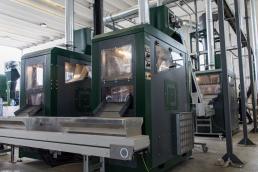
You notice other companies that are moving in the same direction as you?
Apart from the great historical realities, I see that many are frightened by the idea of such an investment. Starting a plant is challenging not only economically, but above all because it brings a total change of mentality. For a company that has always made commerce its main activity, it is not easy to understand the advantages that a treatment plant brings. Unfortunately, or fortunately for us, the mentality of many Italian and European companies is still stuck in simple trade.
What advice would you give to a company that is considering moving from trading to scrap processing?
That if he doesn’t want to hurt himself, first of all, he must have a clear idea of what he wants to do and where he wants to go. When you start to get involved on this front, it is good to know what you want to get out of the treatment plant and, consequently, to have fairly concrete commercial outlets. I don’t mean having a ready-made customer package, but at least knowing where to market the various outputs. The same thing also applies to those fractions on which disposal must be paid.
For example, before investing in the Panizzolo Recycling Systems refining plant, I did a market study to understand how to enhance the plastics that we will have obtained from the treatment process. A company that wants to thrive in this business must keep under control not only what is obtained from the plant, but in particular all the direct and indirect costs that processing can bring.
